Migrant workers could help plug the tradie skills gap
SHARE THIS ARTICLE

Tradies are an integral part of the Australian workforce. Despite this, there is a clear shortage of these skilled workers, and without them, construction demands could halt and exacerbate the housing crisis. This is where the hiring of migrants could assist.
Reports claim that there has been an 80 per cent increase in homes under construction compared to pre-pandemic levels. Concerningly, however, 2021 reported the lowest number of apprenticeship completions since 1999.
If Australia is to keep up with construction demands, more effort is needed to bring people into this lifeblood industry. In fact, according to Master Builders Australia, the country needs 1.2 million homes built over the next five years to keep up with demands.
With strain on the domestic workforce looming over this daunting task, looking globally may be the answer.
“We heard from BuildSkills Australia this week that the industry needs to attract 90,000 tradies in the next 90 days. The domestic workforce cannot keep up with demand in the short term. Skilled migration represents a vital piece of the workforce puzzle,” commented Master Builders Australia chief executive Denita Wawn.
Migrants make up almost a third (32 per cent) of the total Australian workforce. This figure drops to 24 per cent in the construction industry. Meanwhile, migrants who arrived in the last five years make up just 2.8 per cent of the workforce. There is clearly an opportunity to utilise skilled international workers.
“Australia is not alone when it comes to skilled workforce shortages which will prove a challenge in itself. When seeking to attract more skilled trades into Australia, it is important to look to migrants who are already in the country,” explained Wawn.
“This is an underutilised cohort of potential workers who could fill workforce gaps in the short term. There are a number of skilled migrants already in Australia who are working in roles below or unrelated to their qualifications or work experience in their home country.”
She continued: “Some are waiting on skills assessments or qualifications recognition, which, according to the Parkinson Migration Review, could cost nearly $10,000 and take up to 18 months. For many, it is simply too hard to have their professional capacity recognised to work in a trade in Australia, and they are instead in roles that present fewer hurdles to obtain. Master Builders believes more support is needed, and the federal budget provides an opportunity to get the ball rolling.”
According to Master Builders Australia, there are a few ways that the government can build a better migrant worker strategy:
- Provide access to English language education to help migrants upskill, noting that this will also assist them if seeking permanent residency.
- Provide simpler and more accessible coaching for migrants on how to find a job in the industry – the higher education space is an example of success in providing support to international students.
- Subsidise the cost of upskilling or training to fill any skills or qualification gap that might exist between the migrant’s home qualification and the Australian requirements.
- Allow migrant workers to access financial subsidies to complete trade apprenticeships.
- Work with state and territory governments to streamline occupational licensing requirements and ensure internationally comparable qualifications or requirements are quickly recognised without the need for long skills recognition processes.
- Ensure pathways to permanent residency are clear and enticing for skilled migrants already in the country who have building and construction qualifications and experience. Fast-track these people to permanent residency if they are working in building and construction.
- Expand eligibility for the graduate visa and graduate visa extension to all Australian Qualifications Framework Certificate III and above qualifications.
Jack Campbell
Jack is the editor at HR Leader.

